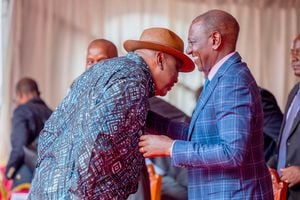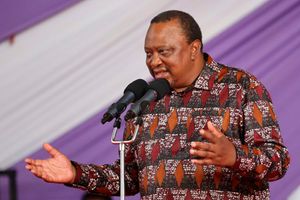
Retired President Uhuru Kenyatta.
President William Ruto’s Kenya Kwanza administration has finally given in to immediate former President Uhuru Kenyatta’s push to use his Caledonia residence just next to State House along Nairobi’s Dennis Pritt Road as his designated retirement office.
The thawing of relations between State House and the office of the retired president as confirmed by the latter’s spokesperson, Ms Kanze Dena-Mararo, ends a two-year protracted war over his retirement package.
So ugly was the situation that the Kenya Kwanza regime withheld at least Sh1 billion that the National Assembly had allocated for the retired president’s office for the financial years 2022/23, 2023/24 and part of the 2024/25.
Ms Mararo confirmed to Nation.Africa that the government agreed the retired president could use his Caledonia residence as his office fully paid for by the taxpayer in line with the Presidential Retirement Benefits Act of 2003 among other benefits.
“I can confirm to you that all is well,” said Ms Mararo. “Everything is smooth between State House and the retired president’s office.”
Pressed further, specifically on the office, Ms Mararo said: “Yes, there were talks and it was agreed the former president uses the Caledonia residence as his retirement office.”
This means that the government is implementing the retirement benefits law for the retired president.
“The other retirement packages have also been complied with. Remember among others, we raised the issue of the former First Lady’s security being withdrawn. The matter was settled after the security was restored as the law demands,” Ms Mararo said.
The budget that the retired president’s office was starved of included the Sh503 million allocated for the 2022/23 financial year.
The year ended without the office having any access to the funds and in the subsequent year, Sh579 million was allocated but the office did not lay its hands on it.
Ms Mararo served under Mr Kenyatta as the head of presidential communication unit at State House before he retired and handed over power to President Ruto on September 13, 2022 after serving his two terms.
President Ruto was announced president-elect after beating Mr Kenyatta’s preferred successor - Mr Raila Odinga in the August 9, 2022 presidential election.
Initially, the government was opposed to Mr Kenyatta’s choice of Caledonia as his official retirement office as it pushed him to use an office that was previously occupied by his predecessor, Mwai Kibaki in Nairobi’s Nyari estate, Gigiri, before his death in April 2022.
The argument advanced by the government operatives at State House was that the Gigiri property had remained vacant and that “it will amount to misuse of public funds if another office was sought and rent paid for using taxpayers’ money while the Gigiri office remains unoccupied.”
However, Mr Kenyatta is said to have been adamant in his preference of the Caledonia residence.
The financing of the statutory benefits for retired presidents and deputy presidents is provided for under the State House Affairs budget line with the State House Comptroller, also the accounting officer of State House budget, as the administrator.
Immediate former Kajiado South MP Katoo Ole Metito is the current State House Comptroller.
Although Mr Metito did not respond to our inquiries sent to his known phone number, Ms Mararo noted that “discussions between the two offices were held and now things are working better.”
“So far so good,” Ms Mararo noted.
The law states that a living retired president be given an office and permanent staff, who shall be public officers remunerated on the terms dictated by Salaries and Remuneration Commission (SRC), a retirement package and insurance costs among others, as safe landing after years of dedicated service to the country.
The law requires the State to ensure that a suitable office space, not exceeding 1000 square metres complete with appropriate furniture, furnishings, office machines, equipment and office supplies, to be provided and maintained by the taxpayer, is available to the retired head of state.
The Nyari property, sitting on about an acre parcel of land, was bought at Sh250 million in 2013 after a public outcry over the Sh700 million that National Treasury had set aside to acquire a new office for the country’s third president.
At the height of the bad relations between state house and Mr Kenyatta’s office, Ms Mararo revealed that whereas salaries and medical insurance had been paid, no other monies spent could be accounted for by the office of the former president.
In June 2024, Ms Mararo, speaking at the Uhuru Kenyatta Institute in Nairobi, that Mr Kenyatta hired as his private office, revealed that her boss had not received new vehicles as stipulated in the Presidential Retirement Benefits Act.
“He is forced to move around using the old transition fleet that he used while handing over power- the vehicles that the state house refused to fuel,” Ms Mararo spoke then.
At the time State House declined to respond to correspondences generated by Uhuru’s office that included requisitions for fuel and maintenance, office operations and facilitation, pending renewal of contracts and budget returns.
Instead, the State House preferred verbal communication of official matters, something that did not go down well with the former head of state.
Ms Mararo at the time noted that written communication for transparency purposes is the mode of communication within government.
Mr Kenyatta also complained of harassment of his staff by State House operatives who made calls at night- well beyond the official working hours- purporting to give instructions.
During that time, the retired president was paying the salaries of two of his senior officers- Ms Mararo, the secretary of communication and Mr George Kariuki, the secretary of administration.
This is after the State House declined to renew their contracts.
The two had not drawn government salaries since Mr Kenyatta handed over power to Ruto.
Ms Mararo then noted that the retired president was using vehicles given to him on an interim basis and had not yet received a new fleet as required by the law.
But as the standoff over the office location endured, the retired president continued to enjoy his other benefits- the monthly pension among others.
The law provides for a monthly pension equal to 80 percent of the monthly salary paid to the president the last month before he left office.
“The pension and other benefits conferred by this Act shall, notwithstanding the provisions of any other law to the contrary, be exempt from tax,” the Act states.
SRC, with a constitutional mandate to review the remunerations and benefits of state and public officers, had reviewed the President’s monthly salary to Sh1.44 million in the July 7, 2017 gazette notice.
However, this notice was annulled by the High Court with no appeal lodged forcing SRC to revert to the March 1, 2013 gazette notice to determine remunerations for state and public officers.
The SRC gazette notice of March 1, 2013 had Sh1,237,500 as the President’s salary at the start of every two of his terms but with a progression rate of Sh103,125 every year.
This means that Sh1,650,000 was the salary of the President by the fifth year of his term in office.
At the disposal of the retired President, the law states, is an entertainment allowance calculated at the rate of 15 percent of the monthly salary.
It is a requirement of the law that the staff shall be posted on the concurrence of the retired president and shall be responsible only to the retired President.
The law entitles a retired president to at least 30 office and home staff that include two personal assistants, four secretaries, four messengers, four drivers and up to six security guards for personal and escort units to be certified by the Cabinet Secretary in charge of Interior.
The living former heads of state are also entitled to a group life assurance covered for a value equivalent to three times of the annual basic salary, Work Injury Benefit Act (WIBA) where applicable and Group Personal Accident cover equivalent to up to three times the annual basic salary where applicable.
The retired heads of states are further entitled to two new cars of their choice with engine capacity not exceeding 3000cc, fully maintained by the state and replaceable every three years.
They are further eligible for two-four-wheel drive motor vehicles of their choice with engine capacity of at least 3400cc replaceable every three years.
An allowance equal to 23 percent of the monthly salary shall be paid to the former president to cater for electricity, water and telephone facilities.
There is also a full medical and hospital cover, providing for local and overseas treatment with a reputable insurance company for the retired president, his spouse and his children below 18 years.
Also at the disposal of the former president is a house allowance equal to 23 percent of the monthly salary and a fuel allowance equal to 15 percent of the monthly salary.
“Adequate security at the retired President’s urban and rural residences may from time to time be certified by the Minister responsible for national security in consultation with the retired President,” the law says.
The retired presidents also have four cooks, four housekeepers, four gardeners, four laundry persons and four house cleaners.
The Act states that upon the death of a serving president or of a retired president who is in receipt of or who is entitled to a pension, his surviving spouse shall be entitled to benefits amounting to 50 percent of such pension.
Jomo Kenyatta, the country’s founding President died while in office in 1978, Daniel Arap Moi retired in 2002 but died in February 2020 and Mwai Kibaki who retired in 2013 after serving his two terms, died on April 21, 2022.









